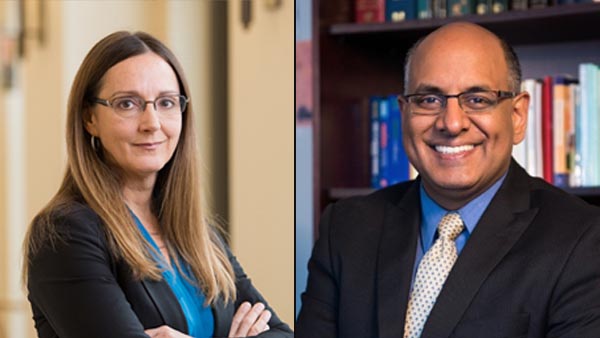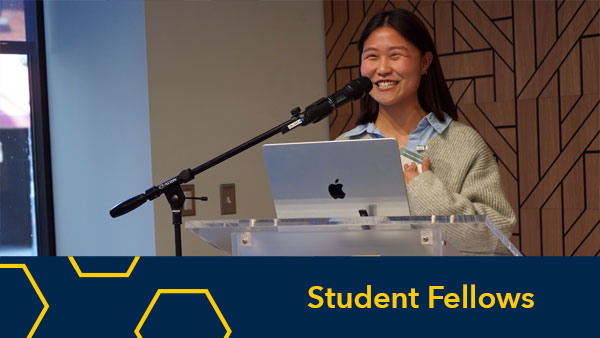
Both will focus on advancing interdisciplinary education through innovation in teaching and learning
Sean Corp, Center for Academic Innovation
Rajesh Mangrulkar and Elisabeth Gerber are joining the Center for Academic Innovation as CAI Faculty Innovators in Residence. Both Mangrulkar and Gerber will work with academic innovation experts at CAI and with faculty partners committed to innovating education through learning innovation and design, educational technology, and educational data and research. Both two-year appointments will begin in September.
Mangrulkar, recently named director of the Michigan Center for Interprofessional Education, was previously associate dean for medical student education and is the Marguerite S. Roll Professor of Medical Education and an associate professor of internal medicine and learning health sciences in the Medical School.
Gerber has years of experience working with the center as the lead faculty innovator of simulation software ViewPoint, and is the Jack L. Walker Jr. Collegiate Professor of Public Policy in the Gerald R. Ford School of Public Policy, professor of political science in LSA, and a research associate at the Institute for Social Research’s Center for Political Studies.
Mangrulkar and Gerber have done transformative work bringing people together to create multi-disciplinary training and inter-professional education across the health and policy fields, said James DeVaney, the founding executive director of the Center for Academic Innovation.
“Our vision for a global public research university encompasses a future in which hybrid teaching and learning at U-M is interdisciplinary, intergenerational, and interprofessional. This extension of our current university mission toward one of global scale and impact will be led by faculty innovators who are committed to transformative change at scale,” said DeVaney. “We are thrilled that professors Mangrulkar and Gerber are bringing their deep expertise to the center and are grateful for the opportunity to work with these innovators as agents of change in teaching, learning, and education.”
Mangrulkar’s new positions will each center on innovating education to improve health. He will stay on as executive director of RISE, an innovation unit he founded within Michigan Medicine in 2019. RISE (Research. Innovation. Scholarship. Education.) aims to improve innovation, collaboration and risk taking in health sciences education that ultimately leads to improved health outcomes. In his new role as director of the center for IPE, Mangrulkar will lead the development of novel educational experiences for teams of students and collaborative care practitioners from 10 schools on three U-M campuses, also with the goal of improving health.
At CAI, he will focus on growing a community of practice of faculty innovators through faculty engagement initiatives ranging from innovator networks and development activities that identify and support leaders in designing the future of education that can improve health outcomes. He will bring his deep experience leading the medical school’s curriculum transformation over the past 10 years to CAI in this new role.
“The culture of innovation in the Center for Academic Innovation is exactly what we should strive to build across U-M’s campus,” Mangrulkar said. “As this pandemic has reminded us, health, whether individual or in our communities, is one of our most important values. The power of this great university is to recognize how all units can have an influence on improving health.”
Gerber developed ViewPoint with the center in 2016 as she was looking for a way to use technology to run complex simulations in her public policy courses. The tool, which received the Provost’s Teaching Innovation Prize in 2019, has been used across colleges and departments within U-M including the Sanger Leadership Center as well as Boston College, Georgetown, Stanford, University of California, Berkeley and even high schools across the country.
She will lead efforts to integrate online and hybrid learning experiences with interactive educational technologies and will lead the design of open learning initiatives that showcase U-M’s interdisciplinary strengths, including the development of open learning offerings on mobility and public policy.
“I look forward to exploring new applications for the center’s educational technology tools in the residential, online, and hybrid learning spaces, as well as serving as a connector between the center and faculty across the university,” Gerber said.
As the center works to foster a culture of innovation throughout the university, it has often identified and partnered with innovative faculty, but this will be the first time those faculty will hold official appointments within the center.
“the continuing advances in our understanding of how people learn and in the technological tools that support learning, provide a tremendous opportunity for educational innovation,” said Susan M. Collins, provost and executive vice president for academic affairs. “I’m pleased that Rajesh Mangrulkar and Liz Gerber are bringing their expertise, imagination and energy to U-M’s growing work in this area.”
Current faculty innovators in residence include Michael Nebeling, an assistant professor in the School of Information, and Michelle Aebersold, a clinical assistant professor in the School of Nursing, who work closely with the XR Initiative on using extended reality in educational and health care settings. Previous innovators include Barry Fishman, professor of education in the School of Education, professor of Information, School of Information, and professor in the Digital Studies Institute, LSA. Fishman collaborated on the development of GradeCraft, an ed tech tool that allows instructors to utilize a gameful learning approach; Gautam Kaul, professor of finance at the Ross School of Business, who developed a number of finance MOOCs and hybrid residential initiatives; and Meghan Duffy, professor of ecology and evolutionary biology from LSA, who served on the center’s advisory committee and spent a sabbatical in residence focused on topics related to mental health, public engagement, and innovation in foundational courses.


